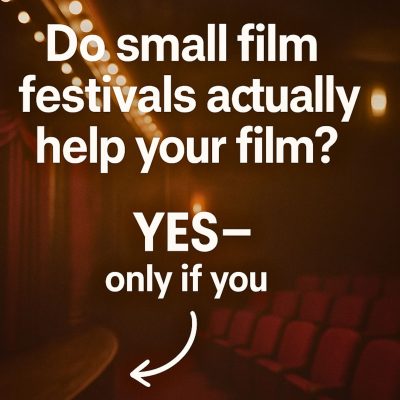
Do Small Film Festivals Actually Help Your Film? Yes — and Often More Than You Think
You didn’t get into TIFF.
You didn’t screen at Berlinale.
No Sundance, no Cannes.
But your film got accepted into a small festival — maybe in Lagos, Lisbon, or Los Angeles.
Now you’re wondering:
“Does this even matter?”
The truth?
Yes. More than you think.
Because while the big festivals celebrate success, small festivals help create it.
The Power of Small Festivals
Every filmmaker dreams of that “major festival” breakout moment. The red carpets. The global headlines. The distribution deals.
But behind most careers that look like overnight success, there’s a long trail of smaller screenings, smaller rooms — and smaller festivals that made the foundation possible.
Here’s what those festivals often do better than the giants:
🎯 A Spotlight Without the Noise
At major festivals, your film is one of hundreds. At a small festival, it’s often the highlight. Your screening gets attention, your Q&A gets time, and your film gets remembered.
🗣 Audiences Who Engage, Not Just Attend
Community-driven festivals attract audiences who care. They don’t rush from screening to screening — they stay, watch, and talk to you afterward. That connection can be far more valuable than 30 seconds of applause at a larger venue.
🏆 Awards That Build Credibility
Winning “Best Short” or “Audience Choice” at a respected smaller festival might not make Variety — but it builds your résumé, IMDb profile, and press kit. Many distributors and programmers scan for consistency, not just fame.
🔍 Distributors Looking for Hidden Gems
Some buyers actually avoid overexposed festival titles. Distributors often scout smaller festivals for unpolished, undiscovered works — stories that haven’t yet been “claimed” by larger players. That’s how films like Lionheart (Genevieve Nnaji’s breakout) caught Netflix’s eye just before its premiere at TIFF, proving timing and positioning matter as much as prestige.
📰 Press That Values Discovery
Local journalists, cultural magazines, and blogs love spotlighting new voices.
When Ava DuVernay screened her early films at Urbanworld Film Festival, the event wasn’t just a platform — it was a partnership that nurtured her growth before she became a global name. Smaller festivals care about the story behind the story.
🤝 Real Relationships, Not Just Contacts
You’re more likely to actually talk to festival programmers, judges, or distributors at a smaller event. You share meals, panels, or even travel together. These moments build genuine professional relationships that last long after the festival ends.
📈 Momentum That Compounds Over Time
Every selection strengthens your credibility. When programmers or journalists look you up, a pattern of consistent screenings and awards signals that your work resonates — not just once, but repeatedly.
How to Choose the Right Festivals
Not every small festival is worth your submission fee.
Some are community gems that nurture filmmakers; others are thinly veiled scams with trophies for sale.
Here’s how to tell the difference:
- Look at Their Past Editions.
Check the films they’ve screened, who attended, and whether there’s follow-up coverage or photos. A real festival leaves a visible digital footprint. - Check Their Partners and Sponsors.
Reputable festivals often partner with embassies, art councils, or creative organizations. - Read Filmmaker Reviews on FilmFreeway.
Honest feedback from past participants will tell you how supportive or organized the event is. - Focus on Alignment, Not Geography.
A small festival that fits your story’s audience is more valuable than a random screening in a city that doesn’t care about your genre or culture. - Don’t Chase Every Laurel.
Submitting to 50 random festivals is a waste. Be strategic — target the 10 that will actually champion your work.
When Small Festivals Become Big Breaks
Ava DuVernay’s I Will Follow premiered at Urbanworld Film Festival and built buzz before she went on to direct Selma.
Today, Urbanworld names her and David Oyelowo as festival ambassadors, a full-circle story that began with one small screening and a room full of believers.
Stories like this remind us that big visibility often starts in small rooms.
Make Every Festival Count
Once you’re selected, treat it as a career milestone — not a footnote.
- Promote it. Announce it across your socials, website, and press releases.
- Document it. Take photos, record your Q&A, collect testimonials.
- Network. Exchange contacts, not just business cards — follow up with people after the festival ends.
- Leverage it. Add those laurels to your pitch deck and EPK. Every win strengthens your next opportunity.
Final Thought
So don’t dismiss your selection.
Don’t shrink your win.
Because these festivals — the smaller, passionate ones — are often where your story begins to take shape.
They don’t just screen your film; they believe in it.
And sometimes, that belief is the spark that changes everything.
Written by Michael Osheku
Creative Director | Film Sales & Distribution Strategist | CreativeTech Entrepreneur
